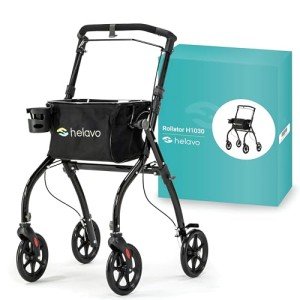Who Is Rollator For Seniors And Why You Should Be Concerned

Understanding Rollators for Seniors: A Comprehensive Guide
As people age, preserving mobility and independence ends up being increasingly important. One tool that has actually transformed senior mobility is the rollator. More than simply a walking aid, rollators supply stability, support, and even a location to rest, allowing seniors to navigate their environments with self-confidence. In this extensive guide, we will analyze what a rollator is, its benefits, types, features, and important considerations for purchase. In get more info , we will address some frequently asked questions to help readers make informed choices.
What is a Rollator?
A rollator is a type of wheeled walker equipped with 3 or four wheels, hand brakes, and a seat. Unlike basic walkers, which require the user to lift them with each step, rollators allow users to push the walker while walking, offering more support and stability. They are particularly developed for individuals who may have balance concerns and require assistance navigating without sacrificing independence.
Benefits of Using a Rollator
The benefits of utilizing a rollator for seniors are numerous. Here are some crucial advantages:
- Enhanced Mobility: Rollators allow seniors to walk more with confidence and conveniently without the requirement to entirely rely on others for support.
- Benefit: With built-in seats, users can take a break whenever they require to, therefore decreasing tiredness throughout outings or errands.
- Security Features: Many rollators included handbrakes that enable users to stop and secure the walker in place, lowering the threat of falls.
- Storage Options: Some rollators come geared up with storage compartments or baskets, making it easier to carry personal items like purses, groceries, or medical supplies.
Kinds of Rollators
Rollators are available in different designs tailored to different requirements and choices. Here's a breakdown of the most common types:
| Type of Rollator | Description | Suitable for |
|---|---|---|
| Requirement Rollator | Typically features 4 wheels and a comfortable seat for resting. | The majority of seniors needing fundamental support. |
| Indoor Rollator | Developed for use inside the home, with slimmer frames for maneuverability. | Seniors needing to browse tight areas. |
| Heavy-Duty Rollator | Constructed with a more powerful frame to support greater weight capacities. | Larger individuals who need strong support. |
| Lightweight Rollator | Made from lightweight products for easy transport and handling. | Seniors who travel often or need to lift the rollator. |
| Rollator with Seat | Features a seat incorporated into the frame, providing a resting option. | Seniors who may tire easily or delight in longer strolls. |
| Three-Wheel Rollator | Offers maneuverability and is designed for tight spaces. | Seniors needing to navigate little areas. |
| Rollators with Accessories | Geared up with trays, baskets, or umbrellas for added convenience. | Seniors looking for extra functionality. |
Features to Consider When Buying a Rollator
When picking a rollator, different features can optimize the experience for seniors. Here's a list of vital features and factors to consider:
Weight Capacity
- Make sure the rollator can support the user's weight easily.
Seat Height
- The seat must be at a comfortable height for the user, permitting easy access.
Manage Height Adjustability
- Search for rollators with adjustable manages so that users can discover their perfect height.
Brakes
- Hand brakes must be easy to engage and disengage, and they should lock securely.
Wheels
- Bigger wheels can handle irregular outdoor surface areas much better than smaller ones.
Frame Material
- Lightweight frames are simpler to maneuver, particularly for seniors with lowered strength.
Portability
- Foldable rollators are easier to keep or transport in a cars and truck.
Storage Options
- Search for baskets or trays for bring items, enhancing functionality during outings.
Devices
- Some rollators come with added accessories like bags, cup holders, and even a flashlight, which can enhance usability.
Style and Color
- Visual preference is also necessary; choosing a rollator that appeals to the user can make a huge distinction in encouraging regular use.
Regularly Asked Questions (FAQ)
Q1: Who should utilize a rollator?
- Rollators are perfect for individuals who have difficulty walking due to age, injury, or medical conditions such as arthritis or post-surgery healing.
Q2: How much do rollators generally cost?
- Rates for rollators can range widely, from around ₤ 70 to over ₤ 300, depending on features, materials, and brand.
Q3: Can rollators be used outdoors?
- Yes, lots of rollators are designed for both indoor and outdoor usage. Search for models with larger wheels for outdoor navigation.
Q4: Are rollators adjustable?
- Most rollators have adjustable deals with and seat heights to accommodate different user sizes and choices.
Q5: Do I need a prescription to buy a rollator?
- Usually, a prescription is not required to buy a rollator. Nevertheless, talking to a doctor can offer tailored recommendations.
Using a rollator can considerably improve the quality of life for seniors, improving their mobility while promoting self-reliance. When selecting the best rollator, think about aspects such as weight capacity, height adjustability, and extra features to discover the ideal match. With the ideal rollator, seniors can take pleasure in greater liberty, confidence, and comfort in their lives. Whether for a stroll in the park or running errands, a rollator could really well be the key to maintaining an active lifestyle as one ages.

